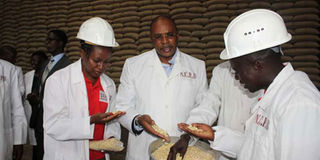Maize shortage traced to PS's poor management

National Cereals and Produce Board of Kenya Chairman Col (Rtd) Geoffrey King'ang'i (centre) at the body's depot in Eldoret on June 28, 2016. PHOTO | STANLEY KIMUGE | NATION MEDIA GROUP
What you need to know:
NCPB managing director Newton Keter said 400,000 bags of maize of the 2.7 million in the government stores are discoloured.
Mr Keter said some of the maize stocks have been in NCPB stores for over eight years instead of the stipulated two-year period.
Mr Keter said blame lay with the trustees of the Strategic Grain Reserve for failing to make timely directives to dispose of the maize.
The National Cereals and Produce Board (NCPB) on Tuesday blamed the government for delaying to order sales of maize from its silos for over eight years, leading to its contamination.
A shortage of quality maize for millers has led to a spike in the cost of maize flour, hitting the poor hard.
Appearing before the Public Investment Committee (PIC) on Tuesday, NCPB Managing Director Newton Keter accused the “trustees” of the Strategic Grain Reserve (SGR), among them principal secretaries in the ministries of Agriculture, Treasury, Interior and Special Programmes, of failing to make timely directives to dispose of the maize.
“Some of the maize stocks have been in our storage for over eight years, beyond the two-year period that is recommended because the trustees have not made a decision that it be disposed. We have … advised the SGR to start disposing [of] and destroying the contaminated stock, which is in progress,” Mr Keter said..
Mr Keter said 400,000 bags of maize out of the 2.7 million in the government stores are discoloured.
Another 500,000 bags were bought last season and are fresh while the rest are more than one-year old.
However, there were fears that the quality of maize stocks could be lower after auditors said they found during a visit to NCPB stores that a “substantial amount” were infested by weevils.
Millers this week warned that the maize stocks in NCPB stores were contaminated and had a yellow colouration.
The millers said they were relying on harvests in Tanzania that would increase the cost 90kg bags, leading to a further Sh15 rise in the price of a packet of flour.
CRITERIA QUESTIONED
MPs on Tuesday accused the NCPB of colluding with millers to declare maize stocks “unfit for human consumption” so that it could be sold to them at a lower price, creating an avenue for personal enrichment at the expense of the poor.
Aldai MP Cornelly Serem noted that some of the millers who had declined to buy maize that was of a superior quality or grade were the same ones that bought huge stocks once its quality had degraded and its cost consequently lowered by the NCPB.
Mr Keter said adequate measures had been taken to ensure the contaminated maize did not find its way back into the “human food chain.”
PIC chairman Adan Keynan also questioned the criteria used in declaring maize stocks unfit for human consumption, saying there could be collusion allowing maize that is fit for consumption to be rejected so as to be sold cheaply.
Mr Keynan said the system through which maize is declared unfit after six months in the silos and two years in the warehouses was open to abuse.
Mr Keter told the committee that the Strategic Grain Reserve management had been advised to adhere to the timelines so as to avoid contamination of maize stocks, which leads to waste or renders them fit only as animal feeds.
He reiterated a statement by Agriculture Cabinet secretary Willy Bett that the country has stocks of up to 10 million bags, which would last until the next harvest expected in September.
(Editing by Joel Muinde and Henry Gekonde)





